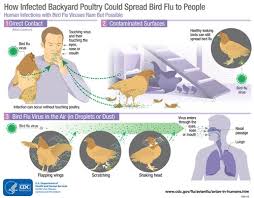Health experts have issued warnings as recent mutations in the bird flu virus suggest it may be edging closer to human transmission, raising concerns about potential outbreaks among humans.
While there has been no recorded instance of sustained human-to-human transmission of bird flu to date, experts caution that recent mutations in the virus indicate a heightened risk. The avian influenza A (H5N1) virus, commonly known as bird flu, has historically affected poultry farms worldwide, with recent outbreaks reported in parts of India.
The transmission of the virus to mammals, including otters, sea lions, foxes, dolphins, seals, and most recently cattle, has raised significant alarm among health officials. The virus’s ability to adapt and circulate among mammals signifies a concerning development, according to Dr. Rajeev Jayadevan, co-chairman of the Indian Medical Association’s National Covid-19 Task Force.
Dr. Jayadevan emphasized that the virus’s newfound ability to spread easily among mammals represents a significant step closer to potential transmission to humans. However, he noted that sustained human-to-human transmission would require further mutations in the virus.
Despite recent concerns, there has been no confirmed instance of bird flu infecting humans in recent incidents. Last week, in Jharkhand’s Ranchi, two doctors and six staff members of a Regional Poultry Farm were quarantined after concerns arose, but subsequent tests yielded negative results for bird flu infection.
Data from the World Health Organization indicates that from 2003 to 2023, there have been 873 reported human cases of infection with influenza A (H5N1) globally, resulting in 458 deaths. However, no sustained human-to-human transmission has been observed thus far.
Biologist Vinod Scaria highlighted the rarity of human infection with avian influenza, stressing that such cases often come with a high mortality rate due to the lack of immune memory for the specific influenza virus.
While current epidemiological and virological evidence does not suggest sustained human-to-human transmission, the recent transmission to cattle has prompted renewed concerns. Genomic analysis indicates that the virus has been silently spreading among cattle for several months, potentially increasing the risk of human exposure.
Scientists are closely monitoring the situation, wary of further adaptations that could enable the virus to easily infect and spread among humans. The World Health Organization recommends preventive measures such as regular handwashing, good food safety practices, pasteurization of milk, and seasonal flu vaccination to mitigate the risk of bird flu transmission.
Ensuring awareness and appropriate protective measures among the public, particularly those in close contact with infected animals, remains crucial in preventing potential outbreaks and mitigating the risks associated with avian influenza.












